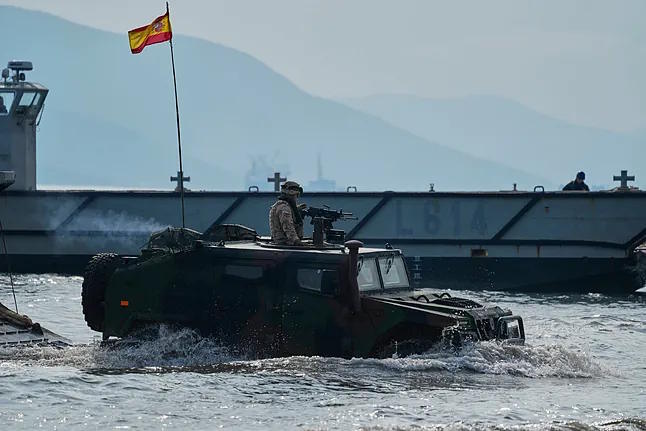"I have insisted that Spain is a serious and reliable ally, always fulfilling its duties and will continue to meet its commitments." The Minister of Defense, Margarita Robles, was the one in charge of representing the Government in front of NATO partners. In Brussels, the Defense ministerial meeting took place, chaired by Mark Rutte, which shifted focus radically in just 24 hours, as while Ukraine was the center, peace negotiations slightly modified the agenda.
But while there was unanimity in supporting Ukraine, disagreement arose regarding Defense spending. The NATO Secretary-General gave Europe a deadline of just five years to be able to defend itself. This requires an investment commitment and a paradigm shift from the countries. A spending to reach the 2% committed in 2014, which Spain has pledged to reach by 2029, with speculation about the possibility of increasing that minimum to 3% at the next NATO summit in The Hague this summer. Spain is running out of time to double its investment.
Aware that it seems impossible to achieve, Robles reiterated Spain's commitment to the rest of the allies. "Spain as a country and ally will fulfill its commitments taking into account something that is worth clarifying: Spain firmly believes in peace, in security," she reiterated. It was then when the minister expressed the message she often repeats: "Talking about Defense spending is talking about spending on peace, it is not correct to talk about armament spending, security spending is much more than spending on weapons, it involves spending in many areas."
This statement comes a month after the Prime Minister, Pedro Sánchez, stated during the Ambassadors' conference that "the world has more urgent priorities to address, and nowhere is it written in any manual that peace and security are achieved by strengthening arsenals," he explained. Now his minister seems to respond publicly that increasing Defense spending entails other things, such as more personnel, more industry for Spain, or, for example, more jobs.
The minister once again supports the Defense culture, necessary for citizens to understand the need to spend in this area. In addition to her speech, since the war in Ukraine began, Robles has made every effort to show Spain's commitment despite the difficulty in increasing spending due to the inability to pass budgets due to a lack of agreements with government partners.
The socialist part of the Government carries out an internal strategy and another one facing partners. In the latter, to show themselves as a reliable ally, they have troops deployed on the Eastern front of NATO. Thus, Spain participates in missions in Latvia, Slovakia, and Romania, in addition to providing naval force in NATO's Standing Naval Groups and in the Sea Guardian operation in the Mediterranean. Also, regarding Ukraine, efforts have been made from Robles' team to show Spain's commitment.
The Air and Space Force mobilized a first shipment of humanitarian aid in coordination with the Ministry of Foreign Affairs 48 hours after the war broke out. As the second winter of the war approached, Spain was the first country to send winter uniforms, specifically 70,000. Leopard 2A4 tanks were rehabilitated to send to Ukraine, which already has 29 Spaniards on the front lines, prepared at a cost borne by Spain, which also contributed ¤100 million in 2023 to the European Peace Fund.
The training of soldiers was also undertaken, first in a Spain-Ukraine bilateral relationship. Later, in the European Union Military Assistance Mission in Support of Ukraine (Euman-UA). Within the framework of the 27. In January, Spain had trained 6,400 Ukrainian soldiers in basic programs where they are trained in combat, casualty treatment, demining, etc., as well as in specific training on donated equipment. For example, the teams that make up each Leopard tank received training in Zaragoza.
Spain also has a program to assist soldiers wounded in combat who suffer severe amputations. Spain organizes their trips to Zaragoza, where they are cared for as long as needed at the General Defense Hospital. They have also launched a program of "peace vacations" where they bring families of soldiers from the front to the military residence in Castellón de la Plana to spend two weeks away from Ukraine.
Internally, and given the current impossibility of increasing Defense spending through GDP, the Government invests billions in Defense programs through budget items approved in the Council of Ministers. Thus, they try to justify themselves as reliable allies by citing the per capita spending data, higher than most allied countries. But Rutte is pressing and gives a five-year deadline to achieve a strategic independence that is challenging for Spain.
